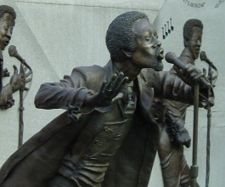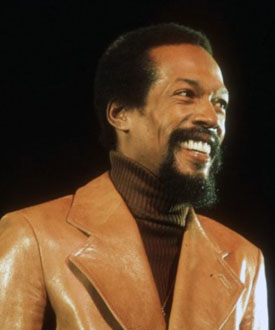Eddie Kendricks
Edward James Kendrick (born December 17, 1939 in Union Springs, Bullock County; died October 5, 1992 in Birmingham) was a soul singer and songwriter best known as a lead vocalist for the Motown legends The Temptations, which he co-founded under the stage name "Eddie Kendricks." As a solo artist, Kendrick recorded several hits of his own during the 1970s, including the number-one single "Keep On Truckin'."
Biography
Early years
Though Kendrick was born in Union Springs, his family moved to Birmingham while he was a boy. He met Paul Williams in their church choir in the late 1940s. In 1955, Kendrick, Williams, and friends Kell Osbourne and Willie Waller formed a doo-wop group called The Cavaliers, and began performing around Birmingham. The group decided to move for better opportunities in their musical careers, and in 1957 Kendrick, Williams, and Osbourne moved to Cleveland, Ohio, with Waller staying in Alabama. In Cleveland, they met manager Milton Jenkins, and soon moved with Jenkins to Detroit, Michigan, where the Cavaliers renamed themselves The Primes. Under Jenkins' management, the Primes did well for themselves in the Detroit area, eventually creating a female spin-off group called The Primettes (later The Supremes). In 1961, Osbourne moved to California, and the Primes disbanded. Kendrick and Paul Williams joined forces with members of The Distants to become The Elgins, who signed to Motown that same year as The Temptations.
The Temptations

The Temptations began singing background for Mary Wells. After an initial dry period, The Temptations quickly became Motown's most successful male vocal group of the 1960s. Among the Temptations songs Kendricks sang lead on (usually in falsetto, but sometimes as a tenor) were "The Way You Do the Things You Do" (the group's first US Top 20 hit), "I'll Be in Trouble", "Girl (Why You Wanna Make Me Blue)", "Get Ready", "Just My Imagination", and "Please Return Your Love to Me". He shares lead vocal duty on other records, including "You're My Everything" (shared with David Ruffin), and a long string of Norman Whitfield-produced psychedelic soul records where all five Temptations sang lead, such as the Grammy winner "Cloud Nine" and "I Can't Get Next to You".
In the Temptations, Kendricks was responsible for creating most of the group's vocal arrangements. He also served as wardrobe manager, including for the now-famous purple suits the group wore for one performance. His favorite food was cornbread, so he was nicknamed "Cornbread" (or "Corn" for short) by his bandmates. According to Otis Williams, Kendricks romantically pursued Diana Ross, lead singer of the Supremes, and he was said to have been close with Martha Reeves of the Vandellas, as well.
Kendricks remained in the group through the rest of the decade, but a number of issues began to push him away from it in the late 1960s and early 1970s. He was uncomfortable with singing the psychedelic style that Whitfield was now crafting for the group as opposed to the romantic ballads they'd sung under the direction of Smokey Robinson. His friend Paul Williams was often too ill to perform with the group, and Kendricks often found himself at odds with bandmates Otis Williams and Melvin Franklin. As he grew away from the Temps, Kendricks began to rekindle his friendship with ex-Temptation David Ruffin, who convinced him to leave the group. Kendricks recorded one last hit single with the Temptations, 1971's "Just My Imagination (Running Away with Me)"; by the time the record reached #1 on the US pop charts in April, Kendricks had quit The Temptations and signed a solo deal with Motown's Tamla imprint.
Solo career
Eddie Kendricks' solo career began slowly; he endured two years of singles that missed the Top 40, while The Temptations continued with their string of Norman Whitfield-helmed hits (one of which, "Superstar (Remember How You Got Where You Are)", was written as a jab towards Kendrick and Ruffin). When Kendricks finally scored a hit in 1973, it was in his first and only solo #1, the Frank Wilson-produced "Keep on Truckin'," which is often cited as a contender for "first disco song". Future hits included "Boogie Down," "Shoeshine Boy," and "He's a Friend."
Kendricks left Motown, forced to sign away the rights to his royalties to do so, in 1978, moving first to Arista Records, and later to Atlantic Records. By this time, his popularity had waned, and he was also gradually losing his voice as a result of chain smoking. He and Ruffin briefly re-joined the Temptations for a 1982 reunion tour. Ruffin and Kendrick (Kendricks dropped the "s" from his stage name during the 1980s) reportedly met up one night when Ruffin went to watch Kendrick perform in a nightclub; Kendrick spotted Ruffin in the crowd, pointed him out, and invited him to come up on stage and perform with him. Afterward they talked about touring on their own and recorded an album as a duo for RCA in 1988.
Earlier, in 1985, they participated in the Hall & Oates live album Live at The Apollo recorded at a benefit at New York City's Apollo Theater; and sang with the duo at Live Aid in Philadelphia and the MTV Video Music Awards in New York City. Hall and Oates have cited Kendrick, Ruffin and the rest of the Temptations as a major influence.
In 1989, Kendrick, Ruffin, and their old Temptations bandmates were inducted into the Rock and Roll Hall of Fame in Cleveland, Ohio. There, Kendrick and Ruffin made plans with former Temptation Dennis Edwards to tour and record as "Ruffin/Kendrick/Edwards, Former Leads of The Temptations." The Ruffin/Kendrick/Edwards project was cut short in 1991, when Kendrick was diagnosed with lung cancer and Ruffin died of a drug overdose.
In late 1991, Kendrick, by now living in his native Birmingham, underwent surgery to have one of his lungs removed in hopes of preventing the spread of the cancer. He continued to tour through the summer of 1992, when he fell ill again and was hospitalized. Kendrick died on October 5, 1992 of lung cancer at the age of 52. He is buried at Elmwood Cemetery. He was survived by his parents Johnny and Lee Bell Kendrick, sister Patricia Simpson, and three brothers: Charles, Robert, and Clarence Kendrick.
On October 16, 1999, the City of Birmingham dedicated a monument to Kendrick on the southwest corner of 4th Avenue North and 18th Street North. It is located in a small park christened the Eddie Kendrick Memorial Park.
Discography
- Eddie Kendricks (1971) All By Myself. Tamla (Motown)
- Eddie Kendricks (1972) People ... Hold On. Tamla (Motown)
- Eddie Kendricks (1973) Eddie Kendricks. Tamla (Motown)
- Eddie Kendricks (1974) Boogie Down!. Tamla (Motown)
- Eddie Kendricks (1974) For You. Tamla (Motown)
- Eddie Kendricks (1975) The Hit Man. Tamla (Motown)
- Eddie Kendricks (1975) He's A Friend. Tamla (Motown)
- Eddie Kendricks (1976) Goin' Up In Smoke. Tamla (Motown)
- Eddie Kendricks (1977) Slick. Tamla (Motown)
- Eddie Kendricks (1978) Vintage '78. Arista Records
- Eddie Kendricks (1979) Something More. Arista Records
- Eddie Kendricks (1981) Love Keys. Atlantic Records
- Ruffin and Kendrick (1988) Ruffin And Kendrick. RCA Records
References
- "Eddie Kendricks." Wikipedia, The Free Encyclopedia. 25 Jul 2007, 20:55 UTC. Wikimedia Foundation, Inc. 7 Aug 2007 [1].
- Colurso, Mary (October 15, 1999) "Honoring Eddie, Birmingham names park for talented son." Birmingham News.
External links
- Eddie Kendricks at Find-A-Grave.com
